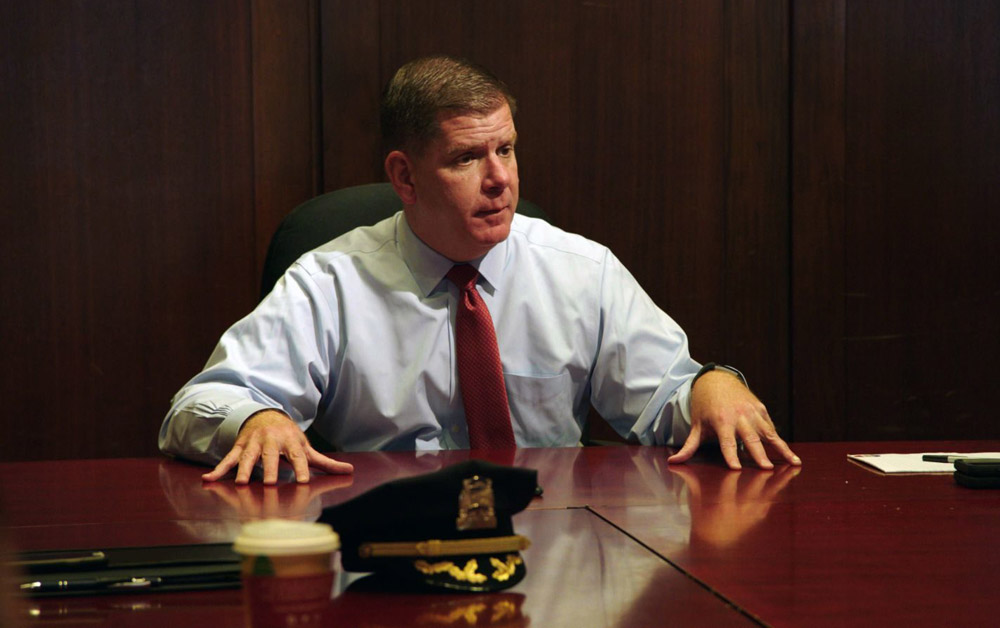Roughly a third of the way through Frederick Wiseman’s “City Hall,” there’s a transfixing scene of a dump truck making its way around Boston, with a city worker tossing increasingly large objects into the back, from your standard garbage bags to mattresses to a BBQ all magically disappearing into the mechanical maw. This is the kind of service that eases the burden of daily life that is never thought about when a government functions properly, but as Wiseman reminds time and again upon leaving the streets to visit various rooms around the city where urban planning and maintenance is taking place, it is the product of feverish debate, compromise and execution that requires ongoing nurturing, advocacy and refinement.
With “City Hall” starting to make its way into the world in the middle of a pandemic in which the response has seemed less than ideal, it’s both comforting to see these gears being constantly in motion with the best intentions behind them as it follows Mayor Martin Walsh into meetings about better coordination of city services or planning the logistics of the parade celebrating the Red Sox recent World Series win or distressing when revealing the inefficiencies of the whole process and how slowly it yields results. The film rarely spends time in what one might imagine as the traditional corridors of power, instead illuminating all the places throughout Boston where small pushes towards progress are taking place from committees convened to talk about housing accessibility, a theme running throughout the film’s galvanizing four-and-a-half hours, to events encouraging more diverse representation in local government and city contracts.
The conversations may never rise above a certain respectable level, but the strong sense of conviction behind all of them keeps your ears perked, whether it’s a lively city-mandated meeting for the entrepreneurs of a medical marijuana dispensary looking to set up shop in Dorchester or a council for the disabled attempting to establish a route that would make it easier to travel to the State House, both measures that are at issue because of their historical status in one way or another. Unfolding chronologically from the fall of 2018 through 2019, Wiseman is able to show what’s working in the city and what’s not through savvy juxtapositions, framing the typically unresolved business of meetings within the calm portraiture of neighborhoods and daily operations that run relatively smoothly and slyly offering parallels to public events and statements meant to advance nobel goals that aren’t effectively getting at systemic issues — while Mayor Walsh makes a point of speaking to Latinx city employees, the film’s later scene at a gathering of Latina businesswomen without government participation offers more practical advice about career advancement when a speaker tells attendees that she went to the trouble of taking golf lessons so she could feel more at ease in the environments where decisions are really being made.
Still, Mayor Walsh proves to be an admirable and compelling figure, refreshingly using his public appearances to frankly discuss the problems that he can’t fix when conversing with constituents often and often turning them into calls to take advantage of what the city can offer so as to show the need for them when planning to dole out the city’s $3.3 billion operating budget. The legendary filmmaker’s real stroke of genius arrives when the filmmaker savvily uses the occasion of the mayor’s speech at a VFW hall for Veterans Day to speak to the city’s history as one of America’s original colonies, an event where the speeches from former soldiers detailing the unimaginable sacrifices made to protect the American way of life are left uninterrupted and put into perspective the need to fight for those values on our own soil that have only seemed to increase in recent years. Even those who can agree on a common cause are frequently seen finding it difficult to reconcile their views on a best path forward in “City Hall,” but an actively engaged citizenry, no matter how small those groups can be, becomes a truly magnificent sight for sore eyes, with Wiseman contextualizing all of their frustrations as a part of a system that people remain passionately invested in and can rally around improving, whatever that may mean individually.
“City Hall” will open on October 28th virtually at Film Forum’s virtual cinema.




